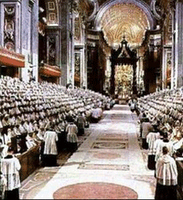Thursday, August 24, 2006
 We continue to read from Chapter Two, more on the notion of the "People of God." First, that the Church sees all human beings as urged toward or called to belong to the People of God. It is part of our created nature:
We continue to read from Chapter Two, more on the notion of the "People of God." First, that the Church sees all human beings as urged toward or called to belong to the People of God. It is part of our created nature:
All ... are called to belong to the new people of God. Wherefore this people, while remaining one and only one, is to be spread throughout the whole world and must exist in all ages, so that the decree of God's will may be fulfilled. In the beginning God made human nature one and decreed that all His children, scattered as they were, would finally be gathered together as one. (Cf. Heb. 1, 2) It was for this purpose that God sent His Son, whom He appointed heir of all things, that be might be teacher, king and priest of all, the head of the new and universal people of the sons of God. For this too God sent the Spirit of His Son as Lord and Life- giver. He it is who brings together the whole Church and each and every one of those who believe, and who is the well-spring of their unity in the teaching of the apostles and in fellowship, in the breaking of bread and in prayers.(Cf. Acts 2, 42)
Christ is the Father's agent in restoring the intended unity among all human beings.
A bit of a clarification follows, namely that the expression of the people of God does not impinge on human activity in the world. The Church accepts and adopts that which has been proven good, a rather Gaudium et Spes way of thinking. Yet these efforts are intended to achieve the spiritual unity of every thinking being under Christ.
It follows that though there are many nations there is but one people of God, which takes its citizens from every race, making them citizens of a kingdom which is of a heavenly rather than of an earthly nature. All the faithful, scattered though they be throughout the world, are in communion with each other in the Holy Spirit, and so, (the one) who dwells in Rome knows that the people of India are ... members"(Cfr. S. Io. Chrysostomus, In Io. Hom. 65, 1: PG 59, 361.). Since the kingdom of Christ is not of this world(Cf. Jn. 18, 36) the Church or people of God in establishing that kingdom takes nothing away from the temporal welfare of any people. On the contrary it fosters and takes to itself, insofar as they are good, the ability, riches and customs in which the genius of each people expresses itself. Taking them to itself it purifies, strengthens, elevates and ennobles them. The Church in this is mindful that she must bring together the nations for that king to whom they were given as an inheritance,(Cf. Ps. 2, 8) and to whose city they bring gifts and offerings.(Cf. Ps. 71 (72), 10; Is. 60, 4-7; Apoc. 21, 24) This characteristic of universality which adorns the people of God is a gift from the Lord Himself. By reason of it, the Catholic Church strives constantly and with due effect to bring all humanity and all its possessions back to its source In Christ, with Him as its head and united in His Spirit. (Cfr. S. Irenaeus, Adv. Haer. III, 16, 6; III, 22, 1-3: PG 7, 925 C-926 Aet 955 C - 958 A; Harvey 2, 87 s. et 120-123; Sagnard, Ed. Sources Chret., pp. 290-292 et 372 ss.)
Here we read that the Church embraces diversity--that's the literal word--in variety of peoples, but also in hierarchical distinction. This distinction is described in terms of duties, not governance. We also have a recognition of Churches different and distinct from the Roman Church, yet who accept the role of the "Chair of Peter" as an instrument of charity and unity.
In virtue of this catholicity each individual part contributes through its special gifts to the good of the other parts and of the whole Church. Through the common sharing of gifts and through the common effort to attain fullness in unity, the whole and each of the parts receive increase. Not only, then, is the people of God made up of different peoples but in its inner structure also it is composed of various ranks. This diversity among its members arises either by reason of their duties, as is the case with those who exercise the sacred ministry for the good of their brethren, or by reason of their condition and state of life, as is the case with those many who enter the religious state and, tending toward holiness by a narrower path, stimulate their (brothers and sisters) by their example. Moreover, within the Church particular Churches hold a rightful place; these Churches retain their own traditions, without in any way opposing the primacy of the Chair of Peter, which presides over the whole assembly of charity (Cfr. S. Ignatius M., Ad Rom., Praef.: Ed. Funk, I, p. 252.) and protects legitimate differences, while at the same time assuring that such differences do not hinder unity but rather contribute toward it. Between all the parts of the Church there remains a bond of close communion whereby they share spiritual riches, apostolic workers and temporal resources. For the members of the people of God are called to share these goods in common, and of each of the Churches the words of the Apostle hold good: "According to the gift that each has received, administer it to one another as good stewards of the manifold grace of God".(1 Pet. 4, 10)